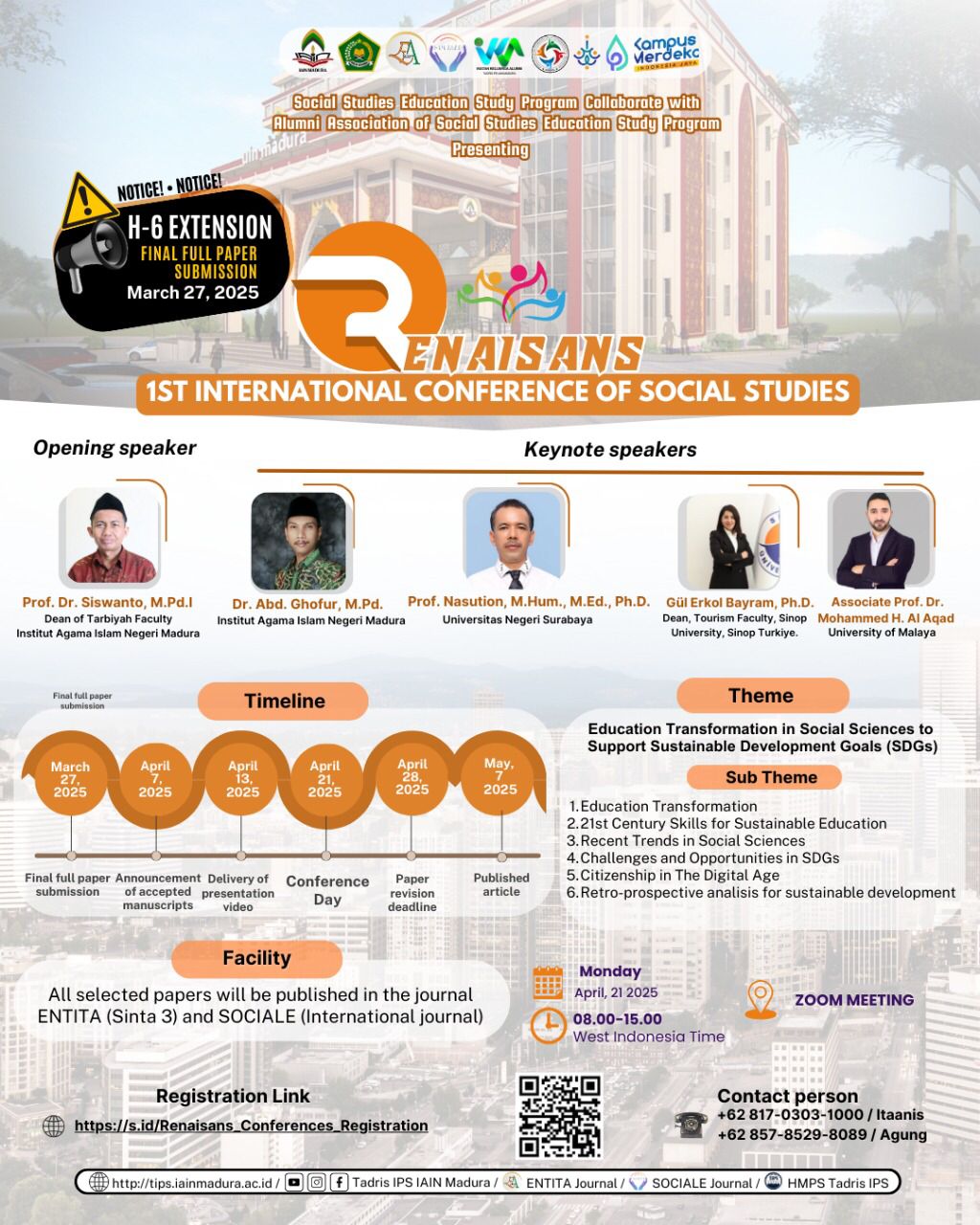Gender and Education in the Context of Sustainable Development Goals
 Abstract views: 353
,
Abstract views: 353
,
 PDF downloads: 283
PDF downloads: 283
Abstract
This research article provides a concise overview of the study on "Gender and Education in the Context of Sustainable Development Goals" by employing a Systematic Literature Review (SLR) with the PICO framework. The study investigates how gender-related factors influence educational access, participation, and outcomes within the framework of Sustainable Development Goals, particularly SDG 4 (Quality Education) and SDG 5 (Gender Equality). Using the PICO criteria—Population (diverse gender groups in formal and non-formal education), Intervention (inclusive education policies, empowerment programs, and strategies to reduce gender disparities), Comparison (various international policies and practices), and Outcome (impacts on educational quality and SDG achievement)—the review synthesizes findings from peer-reviewed articles published within the last five years. The results highlight that gender-responsive education policies significantly contribute to enhancing educational quality and promoting equality; however, challenges such as social, economic, and cultural barriers continue to impede progress. The paper concludes with recommendations for strengthening regulatory frameworks, expanding access to education for marginalized groups, and integrating gender equality principles into educational curricula to support sustainable development.
Downloads
References
Arnot, M. (2025a). Gender and Education: Theoretical Perspectives and Contemporary Issues. Routledge.
Arnot, M. (2025b). Gender Equality in Education: Policy and Practice in the 21st Century. Routledge.
Bourdieu, P. (1998). Practical Reason: On the Theory of Action. Stanford University Press.
Butler, J. (1990). Gender Trouble: Feminism and the Subversion of Identity. Routledge.
Connell, R. W. (2009). Gender: In World Perspective. Polity Press.
Kabeer, N. (2023). Gender, Work, and Economic Empowerment: Global Perspectives. Oxford University Press.
Kinnersly, P. (2025). Gender-Responsive Teaching: Theory, Evidence, and Implementation. Cambridge University Press.
Unterhalter, E., & North, A. (2021). Education, Gender and International Development: Theories, Policies and Practices. Bloomsbury Publishing.
Journal Articles
Handayani, R. (2020). Implementasi Pedagogi Responsif Gender dalam Pembelajaran di Sekolah Menengah. Jurnal Pendidikan Sosial Dan Budaya, 12(2), 45–60.
Khairi, A. I. (2020). Masyarakat Modern dan Kenakalan Remaja: Suatu Telaah Sosial. ENTITA: Jurnal Pendidikan Ilmu Pengetahuan Sosial Dan Ilmu-Ilmu Sosial, 2(1), 148–163.
Kusuma, A., & Setiawan, D. (2022). Analisis Representasi Gender dalam Buku Ajar Sekolah Menengah di Indonesia. Jurnal Kajian Gender Dan Pendidikan, 15(1), 89–105.
Murniati, A. (2021). Dampak Pendidikan Gender terhadap Kesadaran Sosial Siswa SMA. Jurnal Pendidikan Kritis, 8(3), 112–126.
Prasetyo, H. (2022). Evaluasi Kebijakan Pendidikan Responsif Gender di Indonesia. Jurnal Pendidikan Dan Kebijakan Publik, 14(4), 67–82.
Pratama, O. (2023). A Perspective on Human Rights, The Economic Liberalization of Education Provision in Indonesia. Entita: Jurnal Pendidikan Ilmu Pengetahuan Sosial Dan Ilmu-Ilmu Sosial, 5(2), 155–170.
Rahmawati, S., & Supriyadi, T. (2024). Kolaborasi Sekolah dan LSM dalam Meningkatkan Kesadaran Gender di Kalangan Pelajar. Jurnal Advokasi Gender, 9(1), 30–47.
Safitri, R. L., & Azizah, S. (2023). Implementation of Discovery Learning Model in Improving Students’ Activity on Social Studies Subject. Entita: Jurnal Pendidikan Ilmu Pengetahuan Sosial Dan Ilmu-Ilmu Sosial, 5(2), 267–282.
Santoso, E. (2023). Pengaruh Pembelajaran Sosiologi terhadap Kesadaran Gender di Kalangan Siswa SMA. Jurnal Pendidikan Dan Keadilan Sosial, 11(2), 55–71.
Stromquist, N. (2018). The global and the local in gender equality reforms in education. Comparative Education, 54(2), 231–244.
Subrahmanian, R. (2020). Gender equality in education: Definitions and measurements. International Journal of Educational Development, 78(102245).
Subrahmanian, Ramya. (2005). Gender equality in education: Definitions and measurements. International Journal of Educational Development, 25(4), 395–407.
Surya, M. (2023). Penerapan Perspektif Gender dalam Pembelajaran Sosiologi: Studi Kasus di Sekolah Menengah. Jurnal Pendidikan Dan Sosiologi, 10(3), 101–118.
Unterhalter, E. (2021b). Gender equality in education: A critical review of theory, policy, and practice. International Journal of Educational Research, 103(101634).
Wulandari, L., & Nugroho, P. (2023). Tantangan dan Peluang dalam Implementasi Pedagogi Responsif Gender di Indonesia. Jurnal Studi Gender Dan Pendidikan, 5(4), 120–135.
Official Reports and Sources
Kinnersly, T. (2025). Gender and Education: Challenges and Strategies in the 21st Century Classroom.
Leach, F., Dunne, M., & Salvi, F. (2014). School-related gender-based violence: A global review of current issues and approaches.
UNESCO. (2021). Reimagining Our Futures Together: A New Social Contract for Education.
UNESCO. (2022). Global Education Monitoring Report: Gender Equality in Education. United Nations Educational, Scientific and Cultural Organization.
UNESCO. (2023). Gender Equality in Education: Progress and Challenges.
United Nations. (2022). The Sustainable Development Goals Report 2022.
Unterhalter, E. (2021a). Education, Gender and International Development: Theories, Policies and Practices.
World Bank. (2022). The Role of Economic Liberalization in Education Development.
Copyright (c) 2025 Entita: Jurnal Pendidikan Ilmu Pengetahuan Sosial dan Ilmu-Ilmu Sosial

This work is licensed under a Creative Commons Attribution-NonCommercial 4.0 International License.
ENTITA: Jurnal Pendidikan Ilmu Pengetahuan Sosial dan Ilmu-Ilmu Sosial operates an Open Access policy under a Creative Commons Non-Commercial 4.0 International license. Authors who publish with this journal agree to the following terms:
- The copyright of the received article once accepted for publication shall be assigned to the journal as the publisher with licensed under a

- Journal is able to enter into separate, additional contractual arrangements for the non-exclusive distribution of the journal's published version of the work (e.g., post it to an institutional repository or publish it in a book), with an acknowledgement of its initial publication in this journal.
- Journal is permitted and encouraged to post their work online (e.g., in institutional repositories or on their website) prior to and during the submission process, as it can lead to productive exchanges, as well as earlier and greater citation of published work (see The Effect of Open Access).
- Here is Copyright Transfer Form that author can download and send to OJS during submission.

















